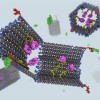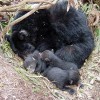Neandertal DNA and Proteins
 With the completion of the Neandertal genome by the team of Dr. Svante Paabo and a closer look at their proteins by Gregory Hannon’s team at CSHL, scientists reveal incredible similarities between Neandertals and humans.
With the completion of the Neandertal genome by the team of Dr. Svante Paabo and a closer look at their proteins by Gregory Hannon’s team at CSHL, scientists reveal incredible similarities between Neandertals and humans.
Neandertals, the extinct species of what are most likely our closest relatives, lived on earth at the same time as our human ancestors but died out about 30,000 years ago. With the sequence of their genome now complete, we can compare the DNA to humans and chimpanzees to learn more about what makes humans unique as a species.
The discovery of fossils is an exciting link to our past. Although the fossil bones do contain DNA, much of it is contaminated. Dr. Emily Hodges at the Cold Spring Harbor Laboratory developed a technique to quickly identify and amplify specific portions of contaminated DNA accurately. Referred to by her team as ‘array capture re-sequencing’, the procedure uses regions of human exons (lengths of DNA that code for proteins) to probe for (or fish out) the Neandertal exons from contaminated DNA samples.
Through the technique they were able to identify 88 differences (in a total of only 83 proteins) between human and Neandertal protein sequences. Amazing!
Go to the following links to access both papers:
The Draft Sequence of the Neandertal Genome:
http://www.sciencemag.org/cgi/reprint/328/5979/710.pdf
Targeted Investigation of the Neandertal Genome by Arrary-Based Sequence Capture:
http://www.sciencemag.org/cgi/reprint/328/5979/723.pdf
For addition information on Neandertals:
Science Magazine:
http://www.sciencemag.org/special/neandertal/feature/index.html
DNA Interactive:
http://www.dnai.org/ (under applications>human origins)
Interviews with Svante Paabo:
DNA From the Beginning:
http://www.dnaftb.org/30/concept/index.html (under audio/video)
| Print article | This entry was posted by Erin McKechnie on May 19, 2010 at 9:58 am, and is filed under DNA From The Beginning. Follow any responses to this post through RSS 2.0. You can skip to the end and leave a response. Pinging is currently not allowed. |









